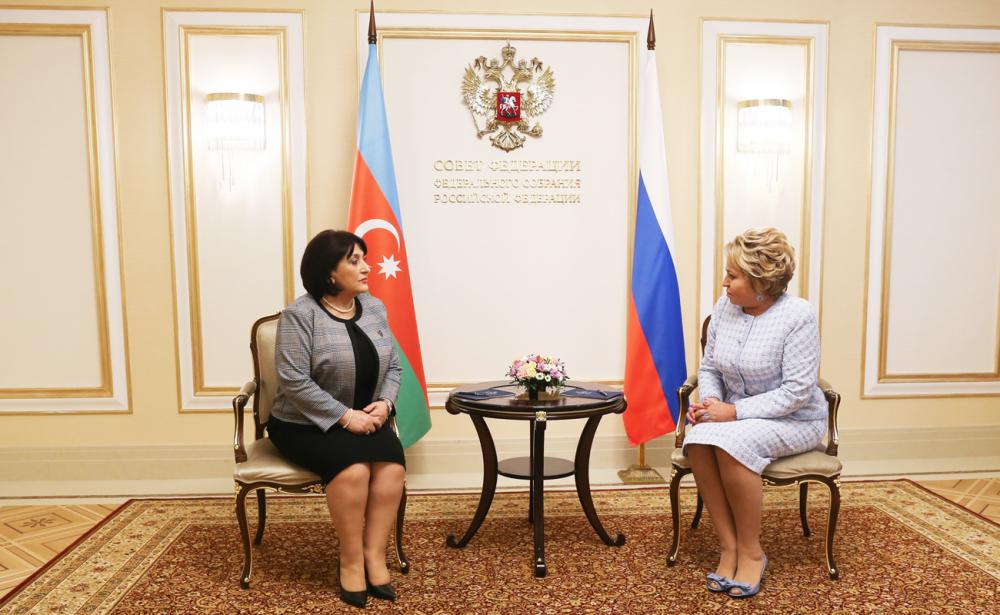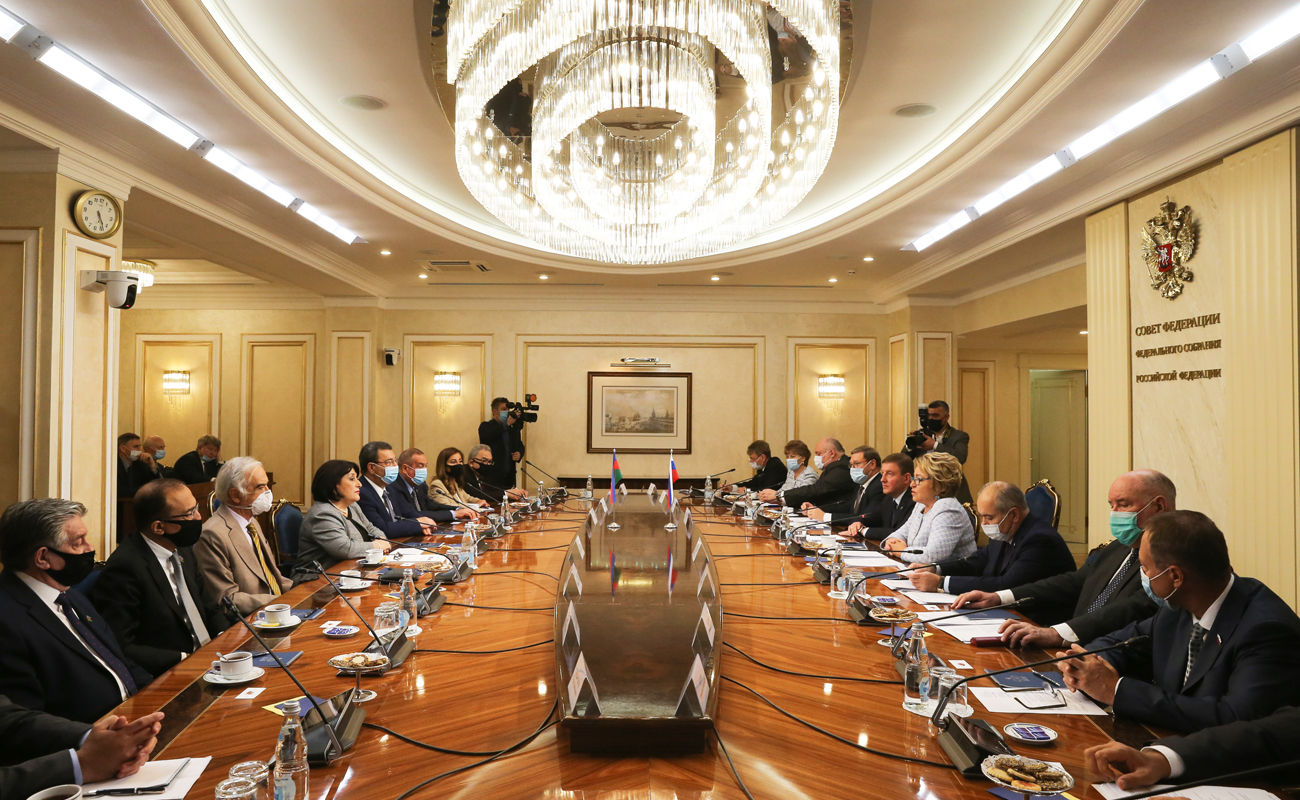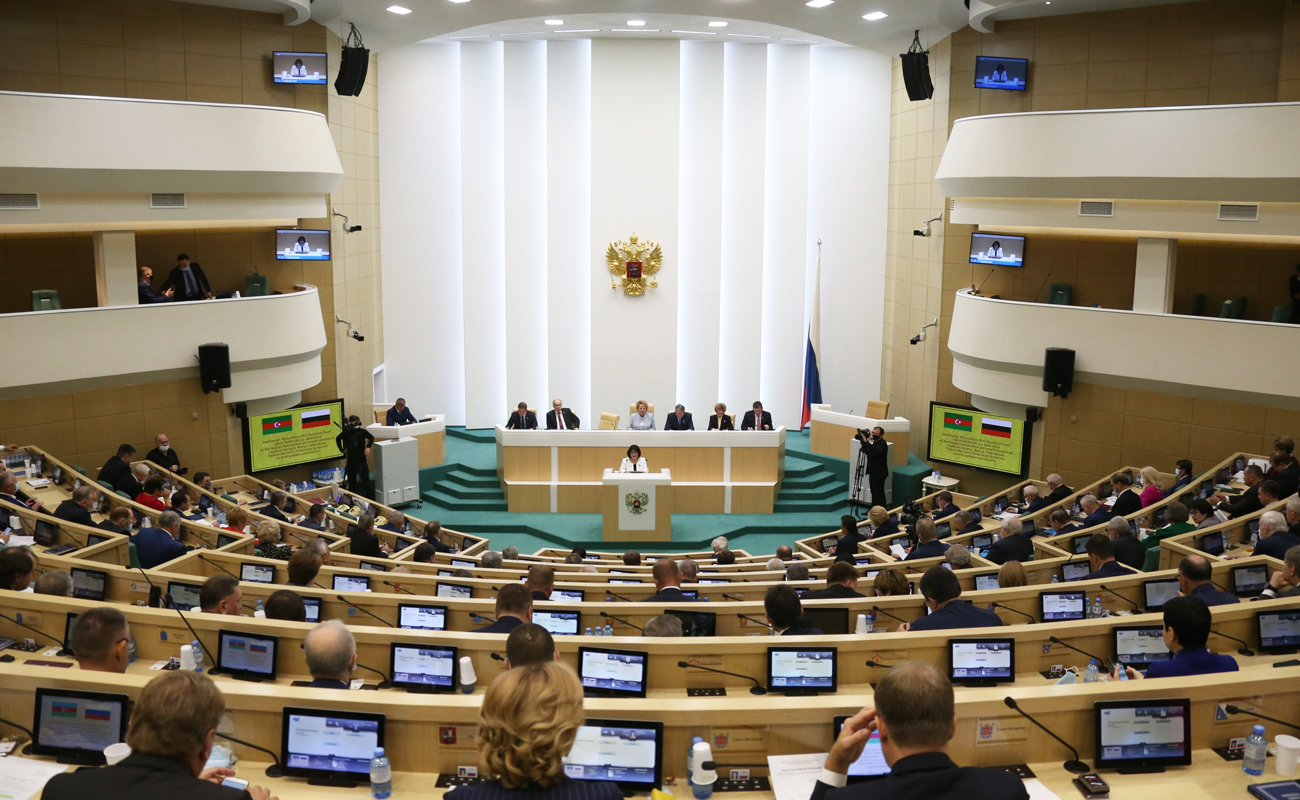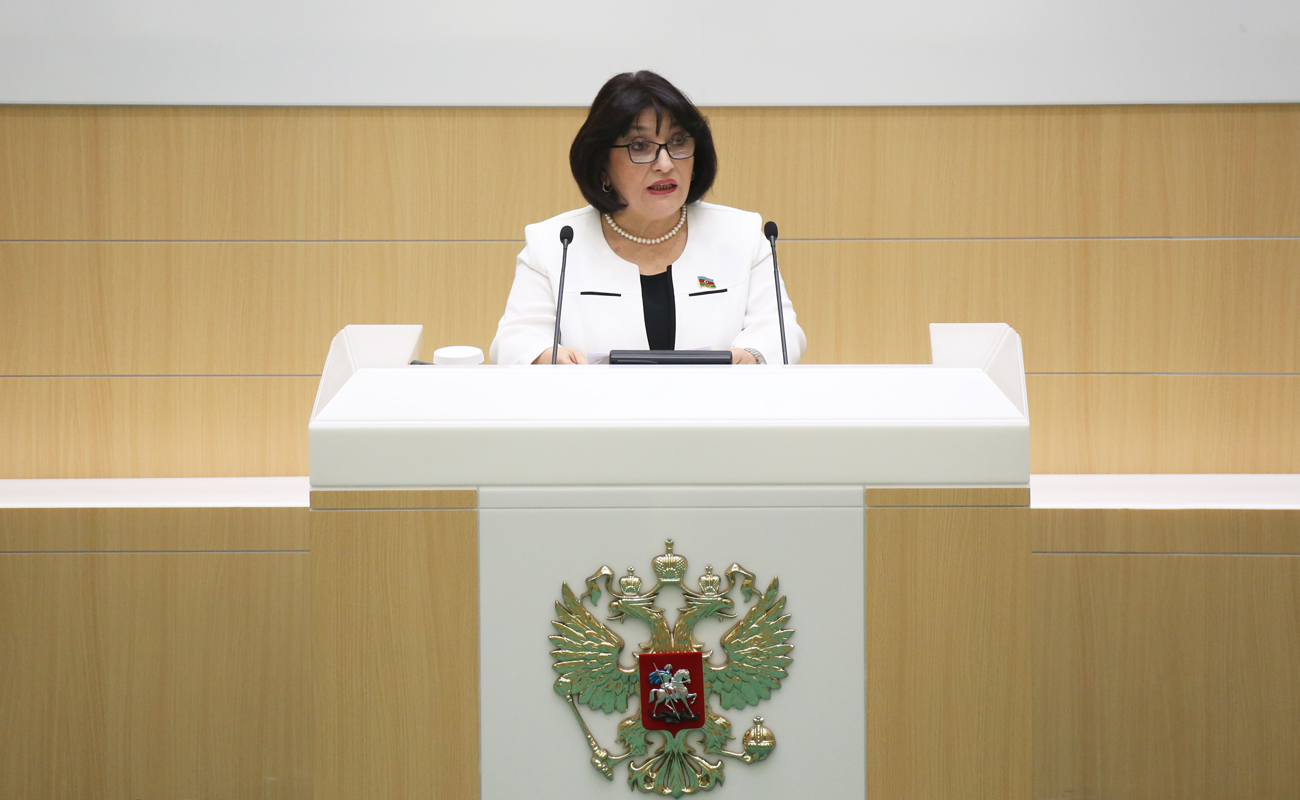The Outcomes of the Azerbaijan Republic Milli Majlis Chair Sahiba Gafarova’s Official Visit to Russian Federation

As we reported earlier, the delegation of the Azerbaijani Parliament led by the Chair of the Milli Majlis Sahiba Gafarova was on an official visit to Russian Federation on 21-23 February. That was Sahiba Gafarova’s first visit to Russia as the Azerbaijani Parliament’s Speaker.
On the first day of the visit, the Milli Majlis delegation arrived at the embassy of Azerbaijan in Moscow to lay a wreath at the bas-relief of the National Leader of the Azerbaijan people Heydar Aliyev on the premises.
On 22 September, Speaker Gafarova met with Valentina Matviyenko, Chair of the Federation Council of the Federal Assembly of the Russian Federation. At that meeting, which went in a positive key and had interesting discussions revolving about a number of the most essential aspects of the bilateral relations, Mrs Matviyenko voiced the Russian side’s appreciation of the Azerbaijani parliamentary delegation’s visit and made a reference to the high level of the current interparliamentary relations.
The tête-à-tête part of that meeting was followed up with the enlarged part involving the delegation members. It was said further that the visit of the delegation was a token of respect for the current relations between the Russian and Azerbaijani parliaments and also that it demonstrated the best intentions. Mrs Matviyenko described Azerbaijan as a strategic partner to Russia before pointing at the considerable role that the interparliamentary co-operation played in building up the interstate relations. Azerbaijan had taken efficient steps in the combat against COVID-19, a challenge to the whole humankind in the 21st century, Mrs Matviyenko added. The Azerbaijani side were thanked for their help in opposing the coronavirus pandemic.
Sahiba Gafarova, in turn, emphasised her confidence that the visit and the meetings due to take place during it would create an added momentum behind the progressing bilateral relations. The political dialogue between the two state leaders Ilham Aliyev and Vladimir Putin as well as their numerous two-way visits played a most crucial role in the transformation of the comprehensive relationship to a strategic partnership, in her opinion.
Mrs Gafarova proceeded to talk about the humanitarian and cultural ties between the two states, stressing that they were in no way inferior to the economic and political relations as much as significance and influence are concerned. The speaker of the Azerbaijani parliament did not omit to mention the massive contribution made to the advancing bilateral humanitarian and cultural interaction by Azerbaijan’s First Vice President Ilham Aliyev whom President Putin decorated with the ‘Friendship’ Order for her exploits in precisely that field in 2019.
On 23 September, Sahiba Gafarova spoke at the opening of the autumn session of the Federation Council of the Federal Assembly of the Russian Federation. There, she mentioned that that was the first time when a speaker of the Milli Majlis of Azerbaijan spoke at a gathering of the Federation Council.
Mrs Gafarova covered the historical roots of the Azerbaijani-Russian relations and the current ties of the two nations in her speech. She referred to the stable and good neighbourhood between Azerbaijan and Russia, that they had signed more than 200 interstate, intergovernmental and inter-ministerial documents encompassing the most diverse areas of interest such as, to name but a few, trade, economic and social matters, humanitarian affairs and military engineering. Those documents provide the legal platform upon which the co-operation can be made stronger in all the areas.
Mrs Gafarova then told of the history of the Armenian-Azerbaijani conflict over Highland Garabagh as she spoke from the rostrum of the Federation Council. She mentioned the signing of a treaty in the village of Kurakchay near Ganja on 14 May 1805 whereby the Garabagh Khanate was to come under the Russian rule. That treaty was signed by Garabagh’s Ibrahim Khalil Khan and the Russian Empire’s General Pavel Tsitsianov. Other Azerbaijani territories were joined to the Russian Empire under the Gulistan Treaty of 1813 and the Turkmanchay Treaty of 1828. The Azerbaijan Democratic Republic was established in 1918 following the demise of the Russian Empire; the ADR had existed for two years only as the Soviet Rule was incepted in Azerbaijan in 1920. A year later – in 1921 – the Caucasus Bureau of the Bolshevik Party decided on Highland Garabagh remaining in the composition of Azerbaijan. Notably, that resolution was about ‘remaining’ and not ‘transferring’ as the deceitful Armenian sources maintain unfoundedly. Then, in 1923, it was decided to form the Nagorno Karabakh Autonomous Province within the national territory of the Azerbaijan Soviet Socialist Republic. The standards of living in that province were higher than in the other parts of the country; nobody was ever discriminated against on ethnic or religious grounds there.
Going further, the Chair of the Milli Majlis mentioned with regret that Armenia had never desisted from the attempts to usurp Highland Garabagh; yet another attempt was made in the 1980s when hundreds of thousands of Azerbaijanis who had lived in their historical land for centuries were evicted from Armenia whilst 700,000 Azerbaijanis of Highland Garabagh and the seven equally Azerbaijani provinces around it were deprived of their land and homes. The ethnic cleansing resulted in the numerous civilian casualties; the demographic situation in the captured territories was then modified in the most illegal fashion and contrary to the international humanitarian laws.
Not only has Armenia been defying the four resolutions of the UN Security Council of 1993, arguably of the highest international status possible, demanding immediate and unconditional withdrawal of the Armenian armed units from the captured Azerbaijani territories, but Armenia has also violated the ceasefire arrangements repeatedly.
Urging the Russian MPs to take notice of the latest provocation by Armenia, Mrs Gafarova also emphasised that that particular provocative act had been committed not in Garabagh but on the state border between Armenia and Azerbaijan. Namely, the populated localities in Azerbaijan’s Tovuz Province were subjected by artillery fire with the resulting loss of life and casualties amongst the Azerbaijani military personnel and civilians on 12 July 2020. That was a brazen travesty of the international humanitarian laws put together including the Geneva Convention of 12 August 1949 and the addenda Protocols to it adopted on 8 June 1977. That was a war crime and this is precisely how that attack is taken.
The Chair of the Milli Majlis reiterated Azerbaijan’s dedication to a peaceful settlement, one to be achieved at the negotiating table. She stressed that a future settlement would have to be rooted in the principle of impartibility of the national territory. Azerbaijan, she emphasised, would never let a second Armenian state be established in its historical lands.
The delegation of the Azerbaijani parliament arrived at the Alexander Park in Moscow and laid a wreath at the Unknown Soldier Memorial on the same day.
As for their next meeting, it was with the Russian Federation Foreign Minister Serghey Lavrov on 23 September.
Mr Lavrov informed the delegation members in detail of the history of the Highland Garabagh Conflict negotiations, the work that had been done on the Madrid Principles and the essence of the latter. At the same time, he repeated voicing the official stance of Russia as one of the Co-Chairs of the OSCE Minsk Group that his country advocated a peaceful resolution of the conflict through negotiations and would continue assisting in the search for a settlement suitable to both conflict parties and based on the arrangements secured by now. Mr Lavrov underlined the importance of resuming the negotiations between the conflict parties involving the Minsk Group Co-Chairs as soon as possible. Besides, the Minister again affirmed the Russian support for the territorial integrity of Azerbaijan.
Next, the delegation met with Chair of the State Duma of the Federal Assembly Vyacheslav Volodin who spoke of the importance of exchanging visits between the two countries as well as of the interstate and intergovernmental relations being at a high level. There was a broad exchange of views upon the continued development of the relations. Mrs Gafarova invited Mr Volodin to Azerbaijan and her invitation was accepted.
It was agreed during the visit of the Azerbaijani parliamentary delegation to form a bilateral high-level commission.
Thereon, the official visit to Russian Federation of the delegation led by Chair of the Milli Majlis Sahiba Gafarova was over.
The Press and Public Relations Department
The Milli Majlis




.jpeg)


.jpeg)
.jpeg)
